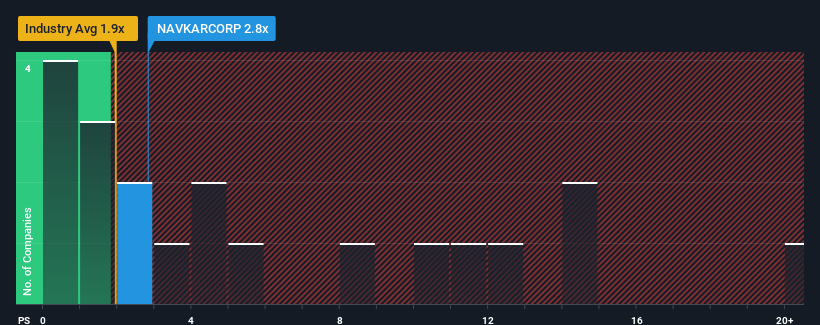Stock Analysis
- India
- /
- Infrastructure
- /
- NSEI:NAVKARCORP
Benign Growth For Navkar Corporation Limited (NSE:NAVKARCORP) Underpins Stock's 28% Plummet

Navkar Corporation Limited (NSE:NAVKARCORP) shares have had a horrible month, losing 28% after a relatively good period beforehand. Looking at the bigger picture, even after this poor month the stock is up 61% in the last year.
Although its price has dipped substantially, Navkar's price-to-sales (or "P/S") ratio of 2.8x might still make it look like a buy right now compared to the Infrastructure industry in India, where around half of the companies have P/S ratios above 3.7x and even P/S above 12x are quite common. Although, it's not wise to just take the P/S at face value as there may be an explanation why it's limited.
See our latest analysis for Navkar

How Has Navkar Performed Recently?
As an illustration, revenue has deteriorated at Navkar over the last year, which is not ideal at all. Perhaps the market believes the recent revenue performance isn't good enough to keep up the industry, causing the P/S ratio to suffer. Those who are bullish on Navkar will be hoping that this isn't the case so that they can pick up the stock at a lower valuation.
Want the full picture on earnings, revenue and cash flow for the company? Then our free report on Navkar will help you shine a light on its historical performance.How Is Navkar's Revenue Growth Trending?
In order to justify its P/S ratio, Navkar would need to produce sluggish growth that's trailing the industry.
Retrospectively, the last year delivered a frustrating 50% decrease to the company's top line. This means it has also seen a slide in revenue over the longer-term as revenue is down 32% in total over the last three years. Accordingly, shareholders would have felt downbeat about the medium-term rates of revenue growth.
Comparing that to the industry, which is predicted to deliver 17% growth in the next 12 months, the company's downward momentum based on recent medium-term revenue results is a sobering picture.
With this information, we are not surprised that Navkar is trading at a P/S lower than the industry. However, we think shrinking revenues are unlikely to lead to a stable P/S over the longer term, which could set up shareholders for future disappointment. There's potential for the P/S to fall to even lower levels if the company doesn't improve its top-line growth.
The Final Word
Navkar's recently weak share price has pulled its P/S back below other Infrastructure companies. Typically, we'd caution against reading too much into price-to-sales ratios when settling on investment decisions, though it can reveal plenty about what other market participants think about the company.
As we suspected, our examination of Navkar revealed its shrinking revenue over the medium-term is contributing to its low P/S, given the industry is set to grow. At this stage investors feel the potential for an improvement in revenue isn't great enough to justify a higher P/S ratio. If recent medium-term revenue trends continue, it's hard to see the share price moving strongly in either direction in the near future under these circumstances.
And what about other risks? Every company has them, and we've spotted 2 warning signs for Navkar you should know about.
If you're unsure about the strength of Navkar's business, why not explore our interactive list of stocks with solid business fundamentals for some other companies you may have missed.
Valuation is complex, but we're helping make it simple.
Find out whether Navkar is potentially over or undervalued by checking out our comprehensive analysis, which includes fair value estimates, risks and warnings, dividends, insider transactions and financial health.
View the Free AnalysisHave feedback on this article? Concerned about the content? Get in touch with us directly. Alternatively, email editorial-team (at) simplywallst.com.
This article by Simply Wall St is general in nature. We provide commentary based on historical data and analyst forecasts only using an unbiased methodology and our articles are not intended to be financial advice. It does not constitute a recommendation to buy or sell any stock, and does not take account of your objectives, or your financial situation. We aim to bring you long-term focused analysis driven by fundamental data. Note that our analysis may not factor in the latest price-sensitive company announcements or qualitative material. Simply Wall St has no position in any stocks mentioned.
About NSEI:NAVKARCORP
Navkar
Navkar Corporation Limited provides container freight station, inland container depot, rail terminal, container train operator, and warehousing and other logistics solutions in India.
Excellent balance sheet with questionable track record.

